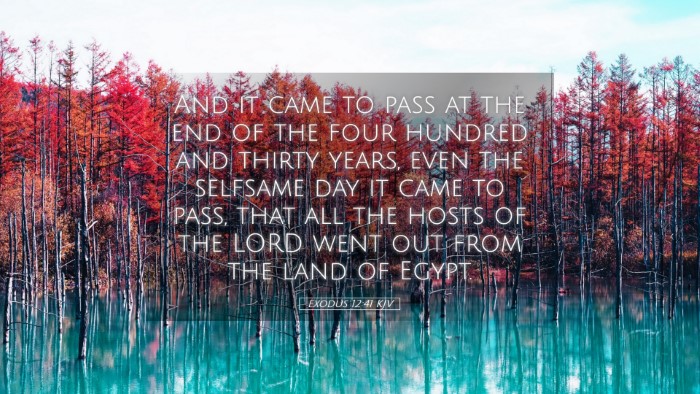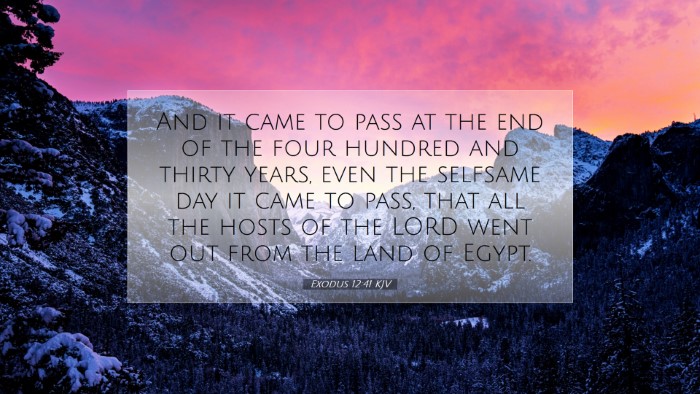Commentary on Exodus 12:41
Verse Text: "And it came to pass at the end of the four hundred and thirty years, even the selfsame day it came to pass, that all the hosts of the LORD went out from the land of Egypt."
Introduction
The verse Exodus 12:41 marks a significant milestone in the history of Israel, detailing the culmination of their sojourn in Egypt that lasted for 430 years. This commentary synthesizes insights from various public domain sources to provide a comprehensive understanding of the meaning, implications, and theological significance of this pivotal moment.
Historical Context
According to historical and biblical timelines, the Israelites' journey to Egypt began with Joseph, who, due to divine providence, rose to power during a time of famine. Over generations, however, the Israelites became oppressed as the Pharaohs turned against them, leading to their plight as slaves in the land of Egypt. This verse signifies the anticipated liberation as foretold by God.
Duration of Enslavement
As noted by Matthew Henry, the 430 years mentioned in this verse encapsulates the entire period from the time of Abraham’s covenant with God until the Exodus. The specific mention of the time period emphasizes God's faithfulness to His promise of liberation once the appointed time was fulfilled.
The Significance of the Date
Albert Barnes elaborates that the phrase "the selfsame day" is indicative of God's precise timing in historical events. Divine timing is a recurrent theme in Scripture, demonstrating that God's plans, though encompassed in years of waiting and suffering, will unfailingly come to fruition according to His sovereign will.
Theological Insights
This event serves not only as historical documentation but also as profound theological reflection concerning divine redemption. The liberation of the Hebrew people reflects the overarching narrative of bondage and freedom, sin and salvation.
God's Faithfulness
According to Adam Clarke, the meticulous recounting of time reveals the faithfulness of God regarding His promises. The 430 years were not merely chronological data; they embodied the struggles, trials, and ultimate hope of a people who trusted in God’s covenantal promises despite adverse circumstances. This underlines a critical aspect of theology—God is steadfast, and His promises may take time, but they are never forgotten.
Symbolism of Departure
The phrase "all the hosts of the LORD went out" signifies not just a physical departure but a spiritual and communal acknowledgment of their identity as God’s chosen people. Matthew Henry emphasizes that this exodus was not only a fulfilment of prophecy but a definitive act of God’s power and authority over Pharaoh and the Egyptian gods, showcasing Jehovah's supremacy.
Application for Today
For pastors, students, and theologians, this verse is a rich source of reflection on God's overarching providence. The transition of the Israelites is a paradigm for modern believers, as it emphasizes the duality of temporal suffering and ultimate divine redemption. Here are some applications drawn from this verse:
- Divine Timing: Trust in God’s timing in personal and communal struggles. Just as the Israelites waited, believers are encouraged to remain steadfast in hope.
- Identity as God's People: Reflect on what it means to be called out as a community of faith and the responsibility it entails in a modern context.
- Faith amidst Adversity: Understand that struggles can often precede significant breakthroughs and cling to God's promises in difficult times.
- Realization of God’s Power: Just as God displayed power over Egypt, recognize God’s authority in our lives and the world around us.
Conclusion
The verse Exodus 12:41 is emblematic of God's faithfulness, the power of liberation, and the significance of divine timing. It serves as a reminder to a contemporary audience that God works through history and within the lives of individuals according to His purpose. In these reflections, worshipers are called to celebrate the God who remembers His covenant and delivers His people from bondage into freedom.


